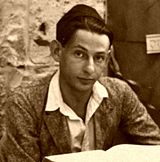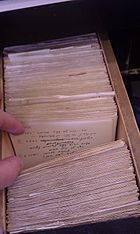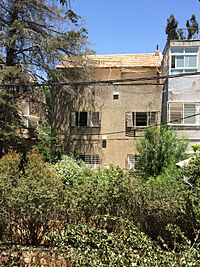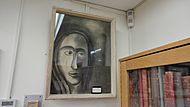Gershom Scholem facts for kids
Quick facts for kids
Gershom Scholem
|
|
|---|---|
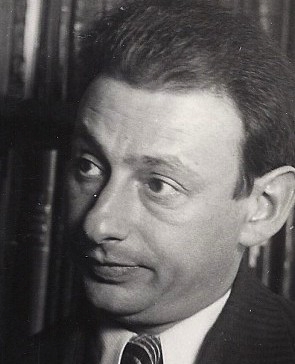
Scholem, 1935
|
|
| Born |
Gerhard Scholem
5 December 1897 |
| Died | 21 February 1982 (aged 84) |
| Nationality | German Israel |
| Alma mater | Frederick William University |
|
Notable work
|
Sabbatai Zevi, the Mystical Messiah Major Trends in Jewish Mysticism |
| Spouse(s) | Fania Freud Scholem |
| Awards | Israel Prize Bialik Prize |
| Era | 20th-century philosophy |
| Region | German philosophy Jewish philosophy |
| School | Continental philosophy Kabbalah Wissenschaft des Judentums |
| Institutions | Hebrew University of Jerusalem |
|
Main interests
|
Philosophy of religion Philosophy of history Mysticism Messianism |
Gershom Scholem (Hebrew: גֵרְשׁׂם שָׁלוֹם) (born December 5, 1897 – died February 21, 1982) was an important German-born Israeli philosopher and historian. He is known for starting the modern academic study of Kabbalah, which is a type of Jewish mysticism.
Scholem became the first professor of Jewish mysticism at the Hebrew University of Jerusalem. He is widely seen as the most important person in bringing back and organizing the many ancient texts of Jewish mysticism. These texts include works like the Sefer Yetzirah, Bahir, and Zohar.
After many years where these sacred Jewish texts were scattered or lost, especially after the terrible events of the Holocaust, Scholem worked to gather them. He found and organized these old writings, many of which had been hidden or taken during the Nazi era. Thanks to his efforts, these important texts became available for scholars and others to study. Many other Jewish scholars helped later, but Scholem began this huge effort to recover and revive these writings.
Contents
Biography
Early Life and Education
Gerhard Scholem, later known as Gershom, was born in Berlin, Germany. His father, Arthur Scholem, was a printer. Gershom had an older brother, Werner Scholem, who became a German Communist leader.
Gershom studied Hebrew and the Talmud with an Orthodox rabbi. In 1915, at age 17, he met Walter Benjamin in Munich. Scholem later dedicated his famous book, Major Trends in Jewish Mysticism, to Benjamin.
In 1915, Scholem started studying at the Frederick William University in Berlin. There, he studied mathematics, philosophy, and Hebrew. He met many important thinkers like Martin Buber and Ahad Ha'am. He also became friends with Leo Strauss and they wrote letters to each other throughout their lives.
Scholem earned a degree in Semitic languages from the Ludwig Maximilian University of Munich. His doctoral thesis was about Sefer ha-Bahir, one of the oldest Kabbalistic texts. His father's publishing house later published it as a book.
Moving to Jerusalem
Scholem was drawn to Zionism, a movement supporting a Jewish homeland in Palestine. Influenced by Martin Buber, he moved to the British Mandate of Palestine in 1923.
After moving, Scholem became a librarian. He led the Department of Hebrew and Judaica at the National Library in Jerusalem. In 1927, he even updated the Dewey Decimal System to better organize large collections of Jewish books.
His brother Werner Scholem was a politician in Germany and was later killed by the Nazis. Unlike his brother, Gershom did not support Communism or Marxism. In 1936, he married his second wife, Fania Freud. Fania helped him with his research, especially on Jacob Frank.
In 1946, the Hebrew University sent Scholem to Germany and Central Europe. His mission was to find Jewish books that the Nazis had stolen and help return them to their owners. This project was called "Otzrot HaGolah."
Gershom Scholem passed away in Jerusalem and is buried in the Sanhedria Cemetery.
Academic Career and Ideas
Scholem became a lecturer at the Hebrew University of Jerusalem. He taught Kabbalah and mysticism from a scientific viewpoint. In 1933, he became the first professor of Jewish mysticism at the university. He held this position until he retired in 1965.
Scholem's way of studying Jewish mysticism was different from earlier scholars. He believed that Jewish mysticism was a living and important part of Judaism, not just something from the past. He thought that the mystical and mythical parts of Judaism were just as important as the rational ones.
He disagreed with some scholars who saw Judaism only through its laws (Halakha). Scholem believed that the non-rational, spiritual side was the true heart of Judaism. He also thought that the study of Jewish mysticism should always be connected to its historical background.
Understanding Jewish History
Scholem believed that Jewish history could be divided into three main periods:
- Biblical Period: During this time, the idea of one God (monotheism) struggled with older myths.
- Talmudic Period: Some magical ideas were removed to focus more on God's pure and distant nature.
- Medieval Period: Jewish thinkers tried to make sense of the abstract idea of God from Greek philosophy with the personal God of the Bible. After this, mysticism grew as people sought to reconnect with the deeper essence of God.
Scholem also suggested that the modern reader should read the works of Franz Kafka to understand the mindset of Kabbalah. He saw Kafka's writings as a kind of modern, mystical text.
Controversial Ideas
Scholem put forward some ideas that were debated. He thought that the 17th-century messianic movement, called Sabbateanism, grew out of a type of Kabbalah called Lurianic Kabbalah. He also suggested that Hasidism developed partly to counter Sabbateanism. Many Hasidic Jews found it surprising to be linked to a movement considered heretical.
He also proposed that the 13th-century Kabbalah came from an older Jewish gnosticism, which was a spiritual movement that believed in secret knowledge.
Language and Truth
Scholem also had a theory about language. He believed that the Hebrew language was special. He thought it was the only language that could truly reveal divine truth. He saw Kabbalists as people who interpreted a divine message already present in language.
Friends and Colleagues
Scholem had close friendships with many important thinkers. His closest friends included Walter Benjamin and Leo Strauss.
He also had a significant, though shorter, relationship with Franz Rosenzweig. Even though Scholem never met Franz Kafka, he later learned that Kafka approved of his ideas in a debate. Scholem and Benjamin's discussions about Kafka helped make Kafka's writings famous.
Scholem spent a lot of his life after World War II recovering and promoting the writings of his friend Walter Benjamin, who died while trying to escape the Nazis.
Martin Buber was an important supporter for both Scholem and Benjamin. Scholem also had strong connections with Hannah Arendt, Theodor Adorno, and Ernst Bloch, even if their relationships were sometimes challenging.
Later in his career, Scholem became friends with writers like Cynthia Ozick, Allen Ginsberg, Harold Bloom, and George Steiner. He was also friendly with the author Shai Agnon and the scholar Saul Lieberman.
Scholem became a very important figure in Jewish thought after World War II and the Holocaust. His influence on both Reform and Conservative Judaism is often compared to that of Martin Buber before World War I.
Debate with Hannah Arendt
After the trial of Adolf Eichmann in Jerusalem, Scholem strongly criticized Hannah Arendt's book, Eichmann in Jerusalem. He felt she lacked solidarity with the Jewish people. Arendt replied that she didn't love any group, but was simply part of the Jewish people. This disagreement led to a break in their friendship, though they continued to respect each other and work on projects related to Walter Benjamin.
Awards and Recognition
- In 1958, Scholem received the Israel Prize in Jewish studies, a very high honor in Israel.
- In 1968, he was chosen to be the president of the Israel Academy of Sciences and Humanities.
- In 1969, he was given the Yakir Yerushalayim (Worthy Citizen of Jerusalem) award.
- In 1977, he received the Bialik Prize for Jewish thought.
Literary Influence
Gershom Scholem's books and ideas have influenced many writers and thinkers. For example, the Argentinian writer Jorge Luis Borges was inspired by his work. Other people influenced by Scholem include Umberto Eco, Jacques Derrida, Harold Bloom, and George Steiner.
American author Michael Chabon said that Scholem's essay, The Idea of the Golem, helped him write his Pulitzer-Prize winning book The Amazing Adventures of Kavalier and Clay. The character "Jacob Keter" in Chaim Potok's The Book of Lights is also based on Scholem.
Selected Works in English
- Major Trends in Jewish Mysticism, 1941
- Jewish Gnosticism, Merkabah Mysticism, and the Talmudic Tradition, 1960
- The Messianic Idea in Judaism and other Essays on Jewish Spirituality, 1971
- Sabbatai Sevi: The Mystical Messiah, 1973
- From Berlin to Jerusalem: Memories of My Youth, 1977
- Kabbalah, 1974
- Walter Benjamin: the Story of a Friendship, 1981
- Origins of the Kabbalah, 1987
- On the Mystical Shape of the Godhead: Basic Concepts in the Kabbalah, 1997
- On Jews and Judaism in Crisis: Selected Essays
- On the Kabbalah and Its Symbolism
- Zohar — The Book of Splendor: Basic Readings from the Kabbalah, ed.
See also
 In Spanish: Gershom Scholem para niños
In Spanish: Gershom Scholem para niños
- Martin Buber
- Abraham Joshua Heschel
- Joseph Dan
- Rachel Elior
- Arthur Green
 | Ernest Everett Just |
 | Mary Jackson |
 | Emmett Chappelle |
 | Marie Maynard Daly |


